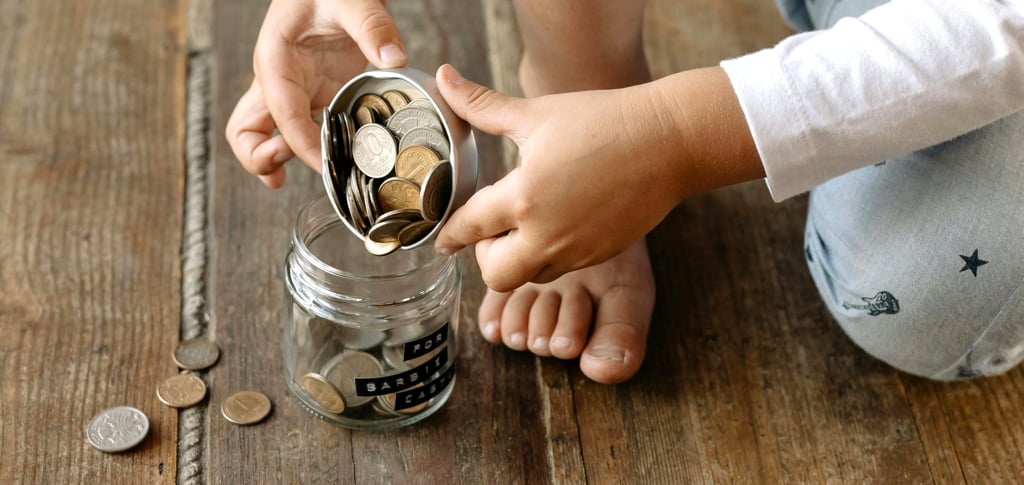Our Money Mindset
Have you ever thought about your mindset with money - your natural beliefs and thoughts? Do you feel content with your current budgeting methods? What messages did you receive from family members as a child regarding saving and spending? .....Let's do a little exploring and consider our mindset and how it can help us with our finances!
SPEND SMART SELF-CARE
T. L. Beyer
3/7/2025


Our Money Mindset
Molding our early years
Something many of us don’t take the time to think about is our mindset regarding money. But, it truly is helpful to stop and do that for a minute, as it can mold our thinking and get us going in the right direction.
And, if we go back to our childhood and reflect on a few things, we can better understand our actions as adults.
What are your earliest memories related to money?
Like many people, my earliest memories involve receiving cash during the holidays. The tooth fairy was probably my earliest memory. It was super exciting to get that quarter the next day!
Receiving cash for any occasion was always fun, it gave me the freedom and control to buy something I wanted. Was I going to get some candy or a new toy? Or, would I save it and eventually get a nicer toy? An important decision had to be made!
If you think about it, those occasional money gifts were our first and simple lessons in money management. Planning and prioritizing were tasks that we eagerly embraced as children. For myself, it took little time to consider how I wanted to spend my riches!
How did your family talk about and handle money growing up?
We all have unique experiences and memories of family members discussing, spending, and expressing emotions regarding their money. Finances can spark many emotions in several different ways.
I remember both sets of grandparents being extremely savvy and careful with spending, inadvertently teaching me those skills. I loved staying all night with my grandma on a Thursday or Friday night in the spring and summer, as we’d wake up early and scout out several garage sales.
I was astounded by the fantastic bargains I could find with a tiny budget. As a little girl, I was impressed easily and loved the experience. This memory instilled the love of a good sale and the potential for stretching my dollar.
At some point in my childhood, I started placing my cash in envelopes. I’m not even sure when or why this happened, but it was a system that made sense to me. I would divide it into different categories that I needed at the time such as spending, saving, and Christmas/birthday gifts for others. Sometimes I would break it down even more and create several envelopes, allotting various amounts to what was most important.
Some of my early lessons and experiences (though I didn’t realize it then), helped guide me toward thinking about my money. Will I save some? Spend some, or use it for a gift? Can I do one or all of these?
Shaping our teenage years
As you grew older, how did you manage your money?
Like most teenagers, I began working part-time when I was old enough. This helped with my basic wants and expenses that a typical teenager encounters.
My parents didn’t discuss money often, but I witnessed what an extremely hard worker my dad was and that motivated me to keep doing what I could to help. If money, at times, was stressful for my parents, they rarely verbally expressed this concern in front of me.
Our beliefs and experiences with money that we experience during childhood affect our financial behaviors. Often, children gather a sense of how stressful things are for their parents just by watching and observing. Parents don’t always have to say much for kids to figure out the pressure and stress their parents are feeling.
If a child experiences this stress frequently, it can lead to anxiety around finances in adulthood. And of course, on the other hand, experiencing a positive approach to money can build financial confidence.
Children may receive various messages from family members regarding their beliefs and actions about budgeting. These messages shape our thinking and continue to evolve as we get older.
Into grown-up years
...How do you feel when thinking about your current financial situation and goals?
...Are you at peace with your money management, or is there room for improvement?
Now that we’ve considered our past and who modeled budgeting habits for us, it’s time to think about our current situation. Maybe we learned all the good stuff and are financially on our way to being excellent stewards of our money. Or do we need to rethink some things and change some of our habits?
Let’s face it: As humans, we tend to do better when we follow a process geared toward our lifestyle. Sometimes, that means digging in just a bit and learning new strategies.
Helping ourselves learn new options is valuable beyond measure. Maybe it’s a tracker, a budgeting book, a website, or a financial podcast that guides and enlightens us.
Taking these ideas that make sense and putting them into action is key. Just get started! We should not continually dwell on our financial past, instead, we should reflect on what we’ve learned from it and move forward.
Mindful actions
Have you ever purchased something you’ve regretted?
If the answer is yes, you are with me and millions of others. This has happened more times than I care to admit. Of course, usually, it’s an item more on the expensive side that upsets me most.
Most of us regret choosing poorly at a restaurant or the store with a new shirt, but we strongly regret when we spend a large amount on something we later realize was a bad decision. Though we kick ourselves, it can be a good lesson that we will remember and, hopefully, not repeat.
One thing is certain: our mindset towards money shapes our spending habits and goals. Being mindful of our spending is the key. There are many things to consider regarding finances, but if we break it down and do what makes sense, that is the solution.
When we are mindful of what we purchase and whether these decisions align with our values and goals, we experience success. If we don't stop and ask ourselves this, we may fall into a pattern of spending that is tough to change.
This means making choices that better our lives without causing financial strain. Feeling as though we are constantly denying ourselves what we enjoy may set us up to fail. We must find a balance and do some smart prioritizing!
So, when deciding to spend on a big-ticket item, consider its long-term value. Will it bring lasting joy or usefulness, or is it a short-lived desire? This thoughtful approach helps us avoid impulsive buys and focus on what truly matters. And don't forget to do your research. When buying these items, spending a little time on the front end is worth it!
Final thoughts….
Our mindset about money, shaped by early experiences and ongoing thoughts, greatly influences our spending habits. It’s a journey of continuous learning, adapting, and finding balance. By understanding our financial beliefs and behaviors, we can do better. In doing so, we nurture a healthier relationship with money that supports our goals and enhances our well-being.
Reflecting on our past, present, and future is the key to getting the right money mindset. Below is a free money mindset journal sheet that gets us thinking about where we’ve been, where we are, and where we want to be. I hope it helps!
Get your free Money Mindest Journal activity exercise HERE.


